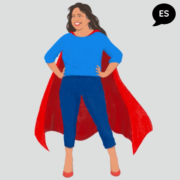La historia de Yolanda: mi camino hacia un diagnóstico de neoplasia mieloproliferativa
La historia de Yolanda: mi camino hacia un diagnóstico de neoplasia mieloproliferativa from Patient Empowerment Network on Vimeo.
Yolanda, paciente latina con trombocitemia esencial (TE), tenía muchos síntomas antes de recibir su diagnóstico final. Observe cómo comparte los síntomas que experimentó, su largo camino hasta el diagnóstico y las lecciones aprendidas sobre el empoderamiento del paciente.
Related Resources:

|

Yolanda’s Story: My Path to a Myeloproliferative Neoplasm Diagnosis |

|
Transcript:
Mi nombre es Yolanda y a mediados de los 40 me diagnosticaron trombocitemia esencial (ET), una neoplasia mieloproliferativa. Soy una mujer latina, y mi camino hasta el diagnóstico llevó mucho tiempo.
Recordando mi experiencia, mis síntomas empezaron con fuertes dolores de cabeza y mareos que me impedían terminar mi trabajo. También experimenté una fatiga debilitante que me mantenía en cama durante un día o me hacía sentir como si mi visión y mi pensamiento estuvieran nublados. Todo era muy extraño y fui al médico, que me recetó antibióticos para una infección. Más tarde sentí entumecimiento y hormigueo en las manos y los pies, y luego dolor en el abdomen. Finalmente, mi médico decidió hacerme análisis de sangre completos para ver qué niveles podían ser anormales, a lo que siguió una biopsia de médula ósea para investigar más a fondo.
Cuando finalmente recibí el diagnóstico de trombocitemia esencial, sentí cierto alivio, pero también una sensación de hundimiento y temor ante lo que podría esperarme. Creo que uno de los problemas a la hora de recibir el diagnóstico puede haber sido que parecía saludable. Tal vez mi médico habría pedido los análisis de sangre antes si no tuviera buen aspecto. Pero intento mirar hacia delante y no hacia atrás.
Me recomendaron un especialista en MPN, que inicialmente me recetó una dosis baja de aspirina. Luego me recetó hidroxiurea (Hydrea). Me ha ido bien y me siento agradecida por tener opciones de tratamiento. Pero si mi enfermedad avanza hasta un punto en el que necesite otras opciones, ya he decidido que consideraré participar en un ensayo clínico. Creo que he sido relativamente afortunada y quiero compartir mi historia sobre el cáncer para ayudar a otras personas.
Algunas de las cosas que he aprendido en mi camino hacia MPN son:
- Empodérate haciendo preguntas a sus médicos sobre su MPN y sobre lo que puede esperar antes, durante y después del tratamiento.
- Infórmese sobre las opciones de ensayos clínicos. Puede haber programas que le ayuden con los gastos de viaje, alojamiento y otros gastos no cubiertos. Y los ensayos clínicos pueden ofrecer una opción para su MPN si ya ha utilizado todas las demás opciones.
- Tú eres la persona responsable de tu salud. Si cree que algo va mal en su cuerpo, defiéndase. Pida que le hagan más pruebas para averiguar qué le pasa.
- Tenga cuidado con dónde busca información sobre el cáncer. Utiliza fuentes creíbles como MPN Research Foundation, The Leukemia & Lymphoma Society y Patient Empowerment Network.
Estas acciones fueron clave para mantenerme en mi camino hacia el empoderamiento.
Share Your Feedback
Create your own user feedback survey




